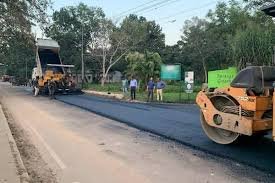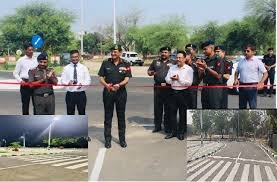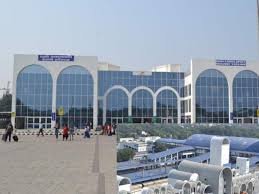Jaipur Military Station: 2nd Military Station to Have Plastic Waste Road
Introduction
The Jaipur Military Station has taken a significant step towards sustainability by becoming the second military station in India to construct a road using plastic waste. This innovative approach not only addresses the pressing issue of plastic waste management but also contributes to the development of eco-friendly infrastructure.
Use of Plastic Waste in Road Construction
The construction of the plastic waste road at the Jaipur Military Station involves the integration of shredded plastic waste into bitumen, which is used for road paving. This method not only enhances the durability of the road but also reduces the environmental impact of plastic waste. By using plastic waste, the military station is setting a precedent for sustainable practices in infrastructure development.
Environmental Benefits
One of the most significant advantages of using plastic waste in road construction is the reduction in plastic pollution. Plastic waste, which would otherwise end up in landfills or oceans, is being repurposed in a productive manner. This initiative not only helps in managing plastic waste but also promotes the concept of recycling and reusing materials, thus contributing to a circular economy.
Economic Impact
The construction of roads using plastic waste is also cost-effective. The process reduces the amount of bitumen required, leading to lower construction costs. Additionally, the durability and longevity of these roads mean lower maintenance costs in the long run. This economic benefit is crucial for large-scale infrastructure projects, especially in a resource-constrained environment.
Future Implications
The success of the plastic waste road at the Jaipur Military Station paves the way for similar projects across the country. It showcases the potential of innovative waste management solutions and sets a benchmark for other military and civilian infrastructure projects. This initiative aligns with the Indian government’s Swachh Bharat Abhiyan (Clean India Mission) and supports the global agenda of sustainable development.

Why This News is Important
Advancing Sustainability in Infrastructure
This news highlights a significant advancement in sustainable infrastructure practices. By utilizing plastic waste in road construction, the Jaipur Military Station is contributing to environmental conservation and setting a model for future projects.
Addressing Plastic Pollution
Plastic pollution is a major global concern, and innovative solutions are crucial for its management. The use of plastic waste in road construction presents a viable solution, demonstrating how waste materials can be repurposed effectively.
Economic Efficiency
The cost-effectiveness of constructing roads with plastic waste is noteworthy. It not only reduces the expenditure on raw materials but also lowers maintenance costs, making it a financially viable option for infrastructure projects.
Supporting Government Initiatives
This initiative aligns with the Indian government’s Swachh Bharat Abhiyan and supports broader goals of sustainability and waste management. It reinforces the commitment to creating cleaner and more sustainable environments.
Inspiration for Future Projects
The success of the plastic waste road at the Jaipur Military Station serves as an inspiration for similar projects nationwide. It encourages the adoption of innovative and sustainable practices in various sectors, including both military and civilian infrastructure.
Historical Context
Plastic Roads in India
The concept of plastic roads was first introduced in India in the early 2000s by Dr. R. Vasudevan, a professor at the Thiagarajar College of Engineering. The idea was to use waste plastic as a binding agent in bitumen, enhancing the durability and strength of roads. Since then, several states in India have adopted this technology, contributing to waste management and infrastructure development.
Swachh Bharat Abhiyan
Launched in 2014, the Swachh Bharat Abhiyan aims to clean up the streets, roads, and infrastructure of India’s cities and rural areas. The use of plastic waste in road construction is a significant step towards achieving the mission’s objectives, promoting recycling and waste management.
Global Context
Globally, plastic waste management has become a critical issue. Many countries are exploring innovative solutions to address the environmental impact of plastic pollution. The success of plastic roads in India serves as a model for other nations looking to implement sustainable infrastructure practices.
Key Takeaways from Jaipur Military Station’s Plastic Waste Road
| Serial Number | Key Takeaway |
|---|---|
| 1 | Jaipur Military Station is the second military station in India to construct a road using plastic waste. |
| 2 | The integration of shredded plastic waste into bitumen enhances the durability and reduces the environmental impact of road construction. |
| 3 | This initiative addresses plastic pollution by repurposing waste materials into productive use. |
| 4 | Constructing roads with plastic waste is cost-effective, reducing both initial construction and long-term maintenance costs. |
| 5 | The success of this project sets a precedent for future sustainable infrastructure projects across India. |
Important FAQs for Students from this News
1. What is the significance of the plastic waste road at Jaipur Military Station?
The plastic waste road at Jaipur Military Station is significant because it is the second military station in India to adopt this eco-friendly method of road construction, demonstrating innovative waste management and contributing to sustainability.
2. How is plastic waste used in road construction?
Plastic waste is shredded and mixed with bitumen, the binding agent used in road construction. This mixture enhances the durability and longevity of the roads while also reducing the environmental impact of plastic waste.
3. What are the environmental benefits of using plastic waste in road construction?
The primary environmental benefits include reducing plastic pollution, promoting recycling, and contributing to a circular economy. This method repurposes waste plastic that would otherwise end up in landfills or oceans.
4. Are there any economic advantages to using plastic waste for road construction?
Yes, constructing roads with plastic waste is cost-effective. It reduces the amount of bitumen needed, lowering initial construction costs, and the resulting roads are more durable, which reduces long-term maintenance costs.
5. What are some of the broader implications of this initiative?
The success of this project at the Jaipur Military Station sets a precedent for future sustainable infrastructure projects across India. It aligns with the Swachh Bharat Abhiyan and supports global sustainability goals.
Some Important Current Affairs Links


















 Exciting News!
Exciting News!  Join Our Telegram Channel Now!
Join Our Telegram Channel Now!
 Join our Telegram channel for a thrilling adventure into the world of daily current affairs.
Join our Telegram channel for a thrilling adventure into the world of daily current affairs. 
 Don’t miss out on the latest updates and insights! Click to join now and be part of the knowledge revolution!
Don’t miss out on the latest updates and insights! Click to join now and be part of the knowledge revolution! 
